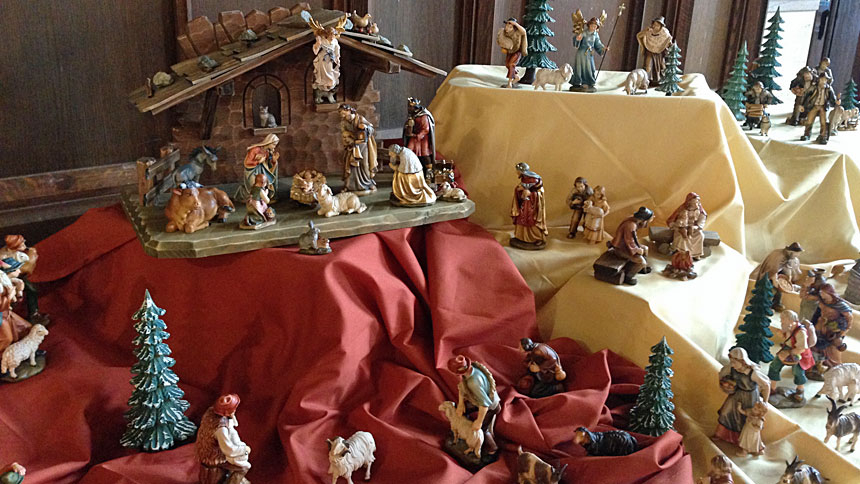
In a time in history in which everything is “virtual,” let us never forget that God becomes one like us in truth and in reality. God does not pretend to be one like us, nor does God become “almost” human, God becomes one like us. This fact must be expressly understood because it celebrates the certitude that at our core humanity is good, good because we are created in the image of our Creator and that core of our goodness can never be undone because it comes from God. As we embrace the gift of our Savior this year, may we commit more and more to living out authentically that image of God, which is our true and inestimable nature; and by that living give glory to God who brings peace and healing with the birth of Jesus Christ in Bethlehem.
Happy, Joyous, and Blessed Christmas from the Office of Worship of the Diocese of Raleigh.
Rev. Dr. James G. Sabak, OFM
Director of Divine Worship
While Saint Francis did not invent the nativity scene or Christmas créche, he did popularize it, and as a Franciscan I have a strong attachment to what this very familiar scene represents. For St. Francis, recreating the narrative of the second chapter of St. Luke’s gospel, physically with adults taking on roles, was a witness to the truth that God becoming one like us, a human being, is more than a theological statement. To truly understand what this witness means, we need to understand the pull, the attraction, which a Christmas créche plays upon us.
A cherished tradition, as Pope Francis has called it, a family’s nativity scene becomes a very personal and very particular expression of familial faith. The necessary symbol of the crèche – when it appears in the home, who is tasked with setting it up, where it is set up, and what figures are placed within it – becomes an indispensable element for embracing the fullness, which the birth of our Savior offers us.
The nativity scene is something unique because, without us realizing it, these cherished scenes reveal the striking paradox of God, which Christmas proclaims. God, who is Most High, Omnipotent, Powerful and Distant, comes to earth, not merely to tarry a while until he gets bored and then return to heaven, where God belongs. No, this God, who is Emmanuel, God-with-us, wraps himself in who and what we are – in what we experience, our struggles, our joys, our anxieties, our accomplishments.
God appears in weakness and vulnerability to take away our fear of God. God does this to be the one who is approachable, as God always takes the initiative. All this is fitting because of God’s passionate, earnest, never-ending desire to be Emmanuel – God-with-us. Our affirming of this desire is what leads to the nativity scene, which reveals how much God will not let anything stand in the way of being with us, of sharing our very life. In this way a Christmas crèche is more than a symbol, but the reality of who Emmanuel is.
And so, the depiction of the nativity scene with its hosts of characters, some intent on observing what they discover in the stable; others drawn only by curiosity; and still others seeming to go about their daily work unaware of how the course of human history has changed forever, represents the spectrum of humanity’s response to God’s great act of selfless compassion. We gaze upon these figures from the familiarity and comfort of our home lives to see ourselves reflected in their images, the gambit of a lifetime of responses to God’s invitation to share life with him as he shares his life with us.
There is much this year as we prepare to enter into Christmas that might work against the powerful symbol of the nativity scene. A pandemic, social and political unrest, pain and suffering, feeling that God cannot be bothered, that we are just an insignificant speck in the cosmos and that it does not matter that we exist at all. Yet if we allow ourselves to be drawn into the nativity scene, we find that it dares to contradict all these ideas in a profound way. It reveals not only that we do matter, but also how much we matter to God. We discover the God who comes to us in a baby born in the City of David, and how much human kindness and compassion are inspired by a greater kindness and compassion, which come from a God who takes on vulnerability and says that this is the only way to glory.

